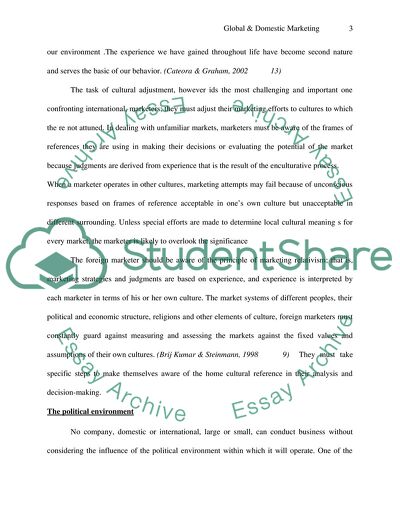
- Home
- Free Samples
- Premium Essays
- Editing Services
- Extra Tools
- Essay Writing Help
- About Us
- Studentshare
- Subjects
- Miscellaneous
- Week 5 Global and Domestic Marketing Paper
Week 5 Global and Domestic Marketing Paper - Essay Example
To adjust and adapt a marketing program to…

- Subject: Miscellaneous
- Type: Essay
- Level: Ph.D.
- Pages: 4 (1000 words)
- Downloads: 0
- Author: zlarkin
Extract of sample "Week 5 Global and Domestic Marketing Paper"
lture; the difficulty facing the marketer in adjusting to the culture lies in recognizing their impact .In a domestic market the reaction to much of the uncontrollable (cultural) impact on the marketers activates is automatic; the various cultural influences that fill our lives are simply a part of our history, and we react in a manner acceptable to society without thinking about it because we are culturally responsive to our environment .The experience we have gained throughout life have become second nature and serves the basic of our behavior.
(Cateora & Graham, 2002 13) The task of cultural adjustment, however ids the most challenging and important one confronting international, marketers; they must adjust their marketing efforts to cultures to which the re not attuned. In dealing with unfamiliar markets, marketers must be aware of the frames of references they are using in making their decisions or evaluating the potential of the market because judgments are derived from experience that is the result of the enculturative process.
When a marketer operates in other cultures, marketing attempts may fail because of unconscious responses based on frames of reference acceptable in one’s own culture but unacceptable in different surrounding. Unless special efforts are made to determine local cultural meaning s for every market, the marketer is likely to overlook the significance The foreign marketer should be aware of the principle of marketing relativism; that is, marketing strategies and judgments are based on experience, and experience is interpreted by each marketer in terms of his or her own culture.
The market systems of different peoples, their political and economic structure, religions and other elements of culture, foreign marketers must constantly guard against measuring and assessing the markets against the fixed values and assumptions of their own cultures. (Brij Kumar & Steinmann, 1998 9) They must take specific steps to make
...Download file to see next pages Read More
- TERMS & CONDITIONS
- PRIVACY POLICY
- COOKIES POLICY